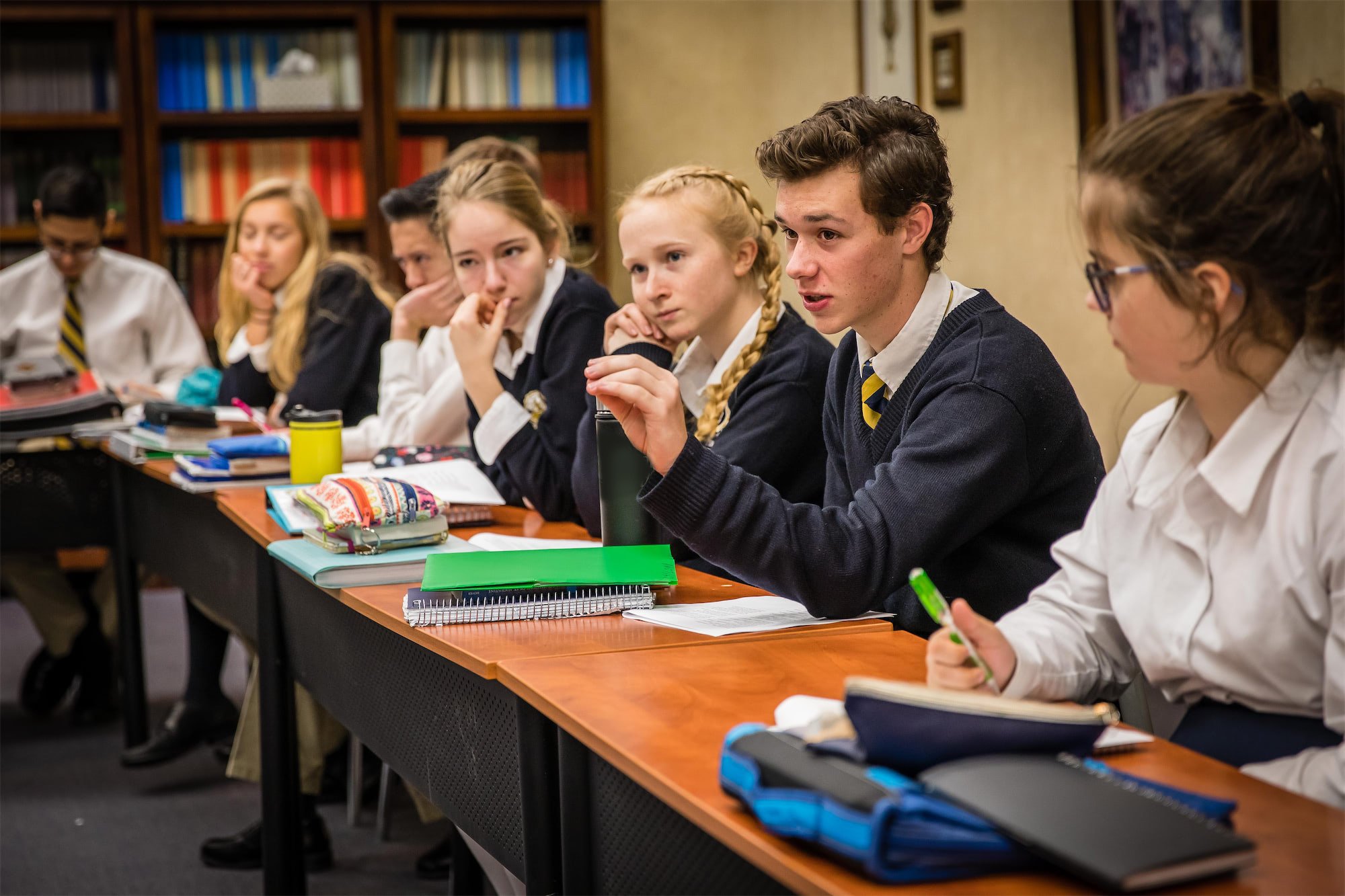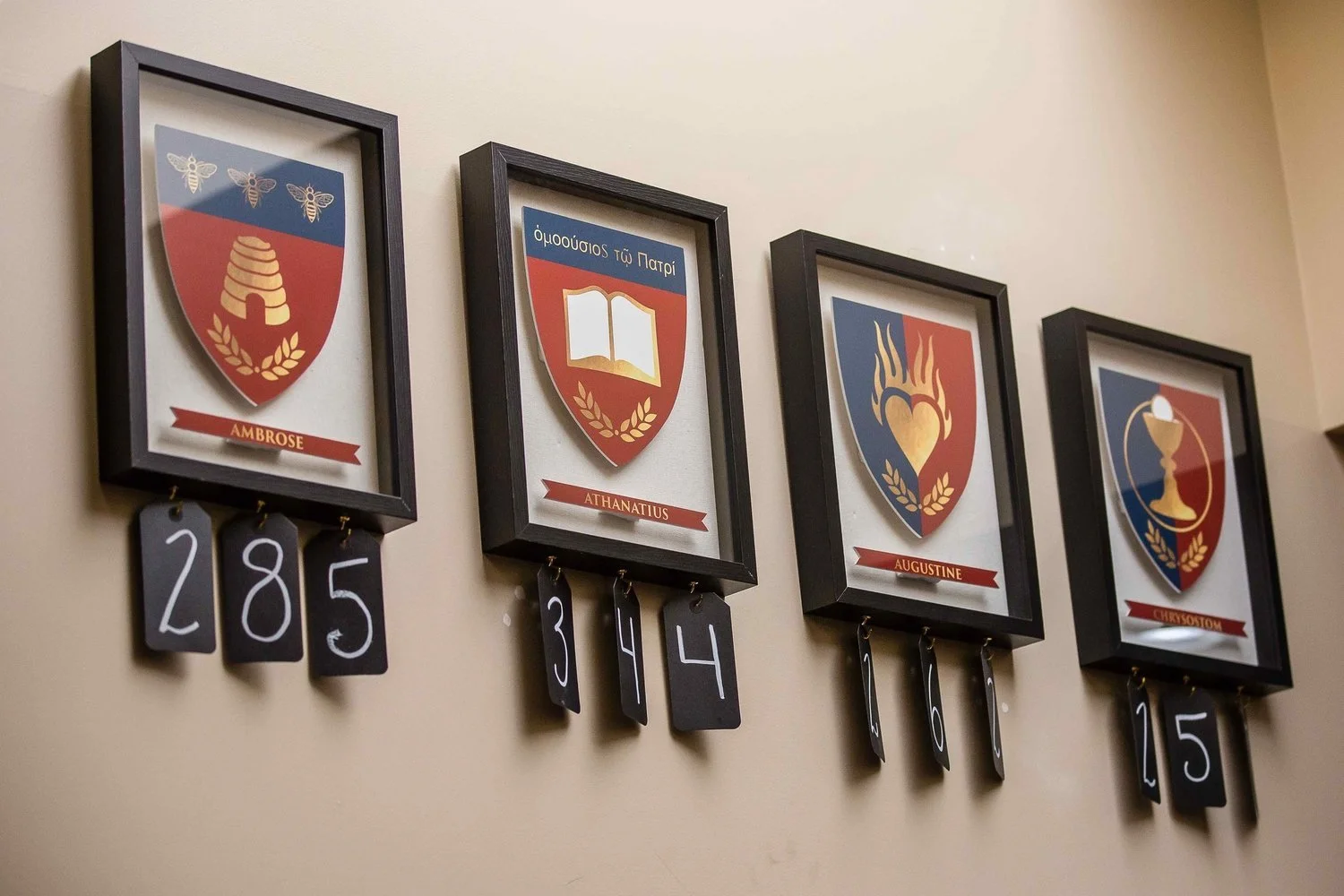
Academics
Our Curriculum
We nurture the minds and the souls of students through an integrated, classical education where faith and reason are intertwined in every course. Students at a Chesterton Academy enjoy a cohesive, content-rich education. A broad exposure to many different disciplines helps students expand their interests and uncover hidden talents. Students are shown how God’s Truth exists in all studies and how subjects relate to one another in holy harmony, not in contradiction or isolation. Each year builds on the previous, so that by the end of senior year, our students are articulate, clear-thinking, well-rounded, and most importantly, joyful individuals.
It pays to go to Chesterton Academy - Queen of Martyrs!
As a member of the Chesterton Schools Network, students gain access to amazing Academic Partnerships with Catholic Colleges and Universities.
Learn more about our partnerships.
-

Humanities
-

Math & Science
-

Fine Arts
-

Faith & Spirituality
-

Student Life
-

House System
Humanities
History, literature, philosophy, theology and languages are braided together in an integrated curriculum utilizing the Socratic Method.
-
Grade 9: Ancient World
Grade 10: Early Medieval Period
Grade 11: High Middle Ages to the Renaissance
Grade 12: Modern World -
Our study of literature is tied to the study of history and the rest of the humanities. Students are first introduced to classical epics of Homer and then exposed to early English classics such as The Canterbury Tales and modern literary renderings of medieval history. Moving towards the modern period, they read Dante, Shakespeare, Dickens, Dostoevsky, Chesterton and American literature. Reading and writing go hand in hand, and each student masters the art of the essay in their writing assignments in all subjects.
-
The history classes at Chesterton Academy form the backbone of our curriculum. The four-year history sequence covers ancient history through the Greek and Roman civilizations, early Church history, the Middle Ages, the Renaissance, and the Reformation and Counter-reformation. In senior year, students study the modern era, including the American and French Revolutions, the Industrial Revolution and the Communist Revolution. Each history course is tailored to provide a colorful backdrop for literature, art and science classes.
-
Philosophy, “the love of wisdom,” exercises the brain while it elevates the soul. The ability to understand abstract concepts leads to clear and systematic thinking in all things. We use philosophy to connect the humanities, but also to show its obvious connection to logic and mathematics. We study the development of philosophy from its classical roots focusing on Plato and Aristotle, its dramatic encounter with the early Church, its christening by St. Thomas Aquinas, and its deterioration in the modern era.
-
Theology, “the study of God,” is the context by which all other texts are studied. The principal theological texts studied are the Bible and the Catechism of the Catholic Church. We also read selections from the Church Fathers, Documents of the Church Councils, and Papal Encyclicals.
-
The study of a foreign language is required of all students for three years. All students are required to take two years of Latin.
Math & Science
Math and science are intimately connected; the logic of math is seen in philosophy and God’s handiwork is seen in the sciences.
-
Mathematics is the art of measuring. Science is the study of what can be measured. While math is woven together with the sciences, it is also connected to the humanities. It teaches logic, which is a basic philosophical principle. It teaches balance, which is a basic aesthetic principle. Math at Chesterton Academy covers Euclidean geometry and algebra, all the way through advanced Calculus.
-
Foundations Track: Euclidean/Analytical Geometry - Algebra I - Algebra II/Trig - Pre-Calculus or Statistics
Traditional Track: Euclidean/Analytical Geometry - Algebra II/Trig - Pre-Calculus - Calculus or Statistics
C-STEM Track: Euclidean/Analytical Geometry - Pre-Calculus - Calculus (AP Calc AB) - Calculus (AP Calc BC) -
Science is the study of the physical world, that is, of God’s creation. None of these subjects can be approached without a sense of wonder. It is fitting, therefore, to begin by looking up at the heavens, at the lights in the sky: Astronomy. Then we take a look at the world God created (Geology), the creatures he created (Biology), and the intricate substances of which all things are made (Chemistry). We end by gaining an understanding of the nature and properties of matter and energy (Physics).
-
Grade 9: Astronomy and Earth Sciences
Grade 10: Biology
Grade 11: Chemistry
Grade 12: Physics
Fine Arts
Equal emphasis is given to the arts, so that every student learns to draw and paint, sing in the choir, act on the stage, give speeches and engage in debate.
-
Music appeals to the ear and the mind, the emotions and the intellect, the senses and the spirit. Chesterton Academy students are exposed to a wide variety of music that they perform chorally several times a year. An education at Chesterton includes music theory, performance, ear training, note reading and musical analysis. Music history is taught according to the grade level with an emphasis on music development within the Church, and corresponds to the historical period in which the students are immersed.
-
A complete education must include the development of the creative nature and must provide students with the tools and the technique with which to express their ideas, their feelings and their love. It must also include the analytical skills with which to judge a work of art and exposure to great art. Finally, the mechanical skills and the aesthetic aptitude must be put into the proper context of eternal Truth. A good artist is a complete thinker and vice versa. The influence of the arts in today’s society cannot be overstated, and this is why art is mandatory at Chesterton Academy all four years.
-
Grade 9: Ancient Art History | Drawing and Calligraphy
Grade 10: Late Roman and Early European Art History | Pastels and Colors
Grade 11: Late Gothic, Renaissance, and Baroque Art History | Oils
Grade 12: Classical, Romantic, and Modern Art History | Oils -
The dramatic arts are particularly powerful in our present culture where movies and the media are often the primary source of knowledge and ideas for many young people. Drama involves the study of how words are brought to life, and in order to successfully do this on stage the actor must learn to see the work as a whole, to understand the author’s vision and the time in which it was written. In other words, the actor must learn to be a good literary critic, philosopher and historian. Drama ties together the information students learn in the classroom and asks them to actively participate in its performance.
-
Grade 10: Comedy
Grade 11: Drama
Grade 12: Shakespeare
Faith and Spirituality
Our students come to understand and embrace the truth of why they exist: to know God, to love Him, and to serve Him in this world and be happy with Him forever in the next.
-
Catholicism is central to our mission. For this reason, every school day begins with Mass. We teach theology out of the Bible, the Catechism of the Catholic Church and papal documents. Other important ways we live the faith include annual pilgrimages and retreats, modest and wholesome extracurricular activities, and sacred art and crucifixes adorn the hall and the classrooms.
-
Each day begins with daily Mass
Weekly opportunities for Adoration
Retreats, Confession, and Spiritual Formation
Faith incorporated into every subject
Chaplains or regular visits from priests
-
We work to find talented and dynamic faculty dedicated to the vision and mission of our school. Each faculty and staff member takes the Oath of Fidelity to the Magisterium at the Mass of the Holy Spirit at the beginning of the academic year. In addition to their teaching responsibilities, faculty at Chesterton Academy participate in the House System.
-
We encourage our schools to provide opportunities for students to go on pilgrimage. In addition to the March for Life and local pilgrimages, Chesterton students travel to Rome and Assisi, Italy. They encounter relics from the saints, sing for the Holy Father and see in real life the wonders of the ancient churches in the Eternal City.
Student Life
Inspired by Saint Pope John Paul II, we take as our motto Cultura Vitae, the Culture of Life. We make it our mission to prepare our students to triumph over the materialism and despair that pervade our culture and to accept our Lord's offer to have life and have it abundantly.
-
We help students grow in the four cardinal virtues of prudence, temperance, fortitude and justice, which we believe are the foundation of leadership.
-
In addition to our offerings in the fine arts, we encourage athletics and other club activities as a way of fostering a fullness of life.
We currently offer:
Cross Country
Entrepreneurial Club
We are partnering with the Madison Area Homeschool Sports League to offer the below for the 2025/2026 school year:
Girls Volleyball
Boys and Girls Basketball
Boys Volleyball
Please contact us if you are interested in assisting one of the above or helping us start a new athletic team or club!
The House System
Chesterton Academy’s House system is drawn from the 1,000 year-old tradition of Christian education exemplified in the colleges at Oxford and Cambridge. The Houses provide real, tangible community within the larger school, giving students the opportunity to take ownership, fulfill the call to leadership, and to cultivate the ideal conditions for virtue. Each House has two Senior and two Junior prefects, two faculty advisors and several parent liaisons. Houses are named for the four saints (two from the West, two from the East) who support the Chair of Peter in St. Peter’s Basilica in Rome.
-
The Houses of Chesterton Academy are engaged in continual competition for the White Horse Cup, which is awarded each year to the House with the most points at the end of the year. The White Horse Cup is proudly displayed in the school office. The winning House’s name is engraved on the cup each year to keep a record for posterity.
-
St. Ambrose (c. 338-April 4, 397) was the bishop of Milan who became one of the most influential ecclesiastical figures of the fourth century. He promoted the rights of the church in relation to the imperial state and is counted as one of the four original Doctors of the Church. He was also the teacher of Saint Augustine.
-
St. Augustine (November 13, 354-August 28, 430), the bishop of Hippo, was both a philosopher and theologian, as well as an influential church leader in north Africa. He framed the concept of original sin and related teachings on divine grace, free will, and predestination, as well as the theory of the just war. His works remain among the most influential in Christian history.
-
St. Athanasius (c. 293-May 2, 373), also known as St. Athanasius the Great, was a theologian who later became the patriarch (“pope”) of Alexandria, a leader of immense significance in the theological battles of the fourth century. He is best remembered for his role in the conflict with Arianism, although his influence covers a vast array of theological topics.
-
St. Chrysostom (c. 347-c. 407), archbishop of Constantinople, is known for his eloquence in preaching and public speaking, his denunciation of the abuse of authority by both ecclesiastical and political leaders, the Liturgy of St. John Chrysostom, his ascetic sensibilities, and his violent opposition to paganism. He is particularly honored in the Eastern Orthodox Church.



